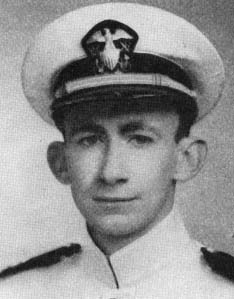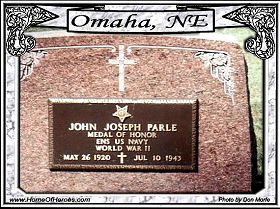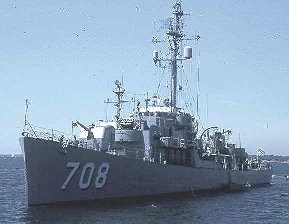Parle Geneology - Resource for Parle Researches Worldwide
In Memory of Ensign John Joseph Parle
From: John Patrick Parle, Michigan and David R Parle, Arkanasa
Ensign John Joseph Parle, USNR
Born: 26 May 1920, Omaha, Nebraska
Died: 17 July 1943 aged 23
Posthumously Awarded the Congressional Medal of Honor
The Congressional Medal of Honor is the highest award that the USA can award
to one of its citizens.
A ship was named after him, the USS Parle DE708.
John Joseph Parle was born 26 May 1920 at Omaha, Nebraska, and enlisted in the U.S. Naval Reserve as Apprentice Seaman at Omaha 11 January 1942. He began Midshipman training at Notre Dame University 5 October and was commissioned Ensign, USNR, on 28 January 1943. Following assignment with the Amphibious Force at Norfolk, Va., he was reassigned to the Northwest African Amphibious Force and attached to LST-375 as officer in charge of small boats during the invasion of Sicily, 9-10 July 1943. The Americans landed at 3 points along the south coast at Gela, Licata and Agriento. His force was to land at Licata.
Courage can come in many forms. One heroic example is that of Ensign John Joseph Parle of the U.S. Navy during World War II. He was awarded posthumously the Congressional Medal of Honour, the highest military honour in the USA. While the war was still raging, a destroyer escort naval ship was named in his honour, the USS Parle. Ensign Parle's story is below, taken from a website in his honour.
Citation
Rank and organization: Ensign, U.S. Naval Reserve. Born: 26 May 1920, Omaha, Nebr. Accredited to: Nebraska. Citation: For valor and courage above and beyond the call of duty as Officer-in-Charge of Small Boats in the U.S.S. LST 375 during the amphibious assault on the island of Sicily, 9-10 July 1943. Realizing that a detonation of explosives would prematurely disclose to the enemy the assault about to be carried out, and with full knowledge of the peril involved, Ens. Parle unhesitatingly risked his life to extinguish a smoke pot accidentally ignited in a boat carrying charges of high explosives, detonating fuses and ammunition. Undaunted by fire and blinding smoke, he entered the craft, quickly snuffed out a burning fuse, and after failing in his desperate efforts to extinguish the fire pot, finally seized it with both hands and threw it over the side. Although he succumbed a week later from smoke and fumes inhaled, Ens. Parle's heroic self-sacrifice prevented grave damage to the ship and personnel and insured the security of a vital mission. He gallantly gave his life in the service of his country.
USS LST 375
Invasion of Sicily, July 9 - 10, 1943
During World War II, the Congressional Medal Of Honor, our nations highest combat award for bravery, was awarded to 57 men who were serving in the U.S. Navy. Two of those men were serving aboard LSTs at the time of their heroic acts. Both men were awarded the Medal posthumously. Ensign John Joseph Parle, of Nebraska, was serving on the USS LST 375. Seaman First Class Johnnie David Hutchins, of Texas, was serving on the USS LST 473.
On July 9, 1943, USS LST 375 was operating in the Mediterranean as part of the Western Task Force for the invasion of Sicily. The Task Force was assigned to land three Army divisions on the southeast corner of the island at Licata. The Task Force approached the coast of Sicily during the evening of July 9, 1943. Soon after midnight, on the morning of July 10, most of the invasion force was in position to mount the assault. As H-Hour approached, the Axis forces still had no idea that the Allied armada was off shore. Any slip could have revealed the presence of the Allied force and endangered the landings.
At that moment, Ensign Parle discovered a smoke pot had accidentally ignited in a small boat loaded with high explosives, setting fire to a fuses and risking detonating ammunition. If those explosives were to detonate, it would have endangered his ship and revealed the presence of the Allied fleet to the enemy. Undaunted by fire and blinding smoke, Ensign Parle entered the craft and extinguished the fuses. After failing in his desperate efforts to extinguish the fire pot, he finally seized it with both hands and running topside threw it overboard.
 He died at a naval hospital in Tunisia three days after the incident with
the smoke pot, of pneumonia and the effects of the smoke and fumes he inhaled.
Ensign Parle's heroic self-sacrifice prevented grave damage to his ship and its
crew and insured the security of the invasion. He gallantly gave his life in the
service of his country. For valour and courage above and beyond the call of duty
Ensign Parle was posthumously awarded the Congressional Medal of Honour.
He died at a naval hospital in Tunisia three days after the incident with
the smoke pot, of pneumonia and the effects of the smoke and fumes he inhaled.
Ensign Parle's heroic self-sacrifice prevented grave damage to his ship and its
crew and insured the security of the invasion. He gallantly gave his life in the
service of his country. For valour and courage above and beyond the call of duty
Ensign Parle was posthumously awarded the Congressional Medal of Honour.
Burial
Location: Omaha, Nebraska, Cemetery: Holy Sepulchre Cemetery.
HISTORICAL NOTE
LST 375 went on to fight in two other major engagements in the European Theatre. She participated in the Salerno landings and the Normandy invasion. She was then assigned to the Pacific Theatre. During her transit of the Pacific Ocean to participate in the invasion of the Japanese mainland, the atomic bomb was dropped and the war against Japan finally came to an end. She then performed occupation duty in the Far East.
For more information on Ensign Parle see en.wikipedia.org/wiki/John_Joseph_Parle .

USS Parle (DE 708)
Destroyer Escort Named in Honour of John Joseph Parle
Keel Laid Down: 8 January 1944
Launched: 25 March 1944
Commissioned: 29 July 1944
Sponsor: Mrs. Harry Vincent Parle (mother of Ensign Parle)
The USS Parle saw action in World War II in the Atlantic and Pacific Theatre
For more information on the USS Parle (DE 708), see www.ww2pacific.com/de708.html.
From Fr. Richard J. Parle
Fr. Richard J. Parle, was the younger brother of Ensign John Parle. When the USS Parle was launched at the Defoe Shipyards in Bay City, Michigan, Richard was still a boy and served as an altar boy for the blessing of the ship. Fr. Tom Parle, who gave the blessing of the ship, was the uncle of Ensign John Parle.
The trip to Bay City for the ship launching is still pretty vivid in my memory. The DE 708 was built by Defoe at their shipyard along the river in Bay City. We went up by train, changing at Chicago and again in Flint. The last leg of the trip was on a car half filled with chickens. A big pot bellied coal stove heated the passenger portion. The shipyard was fascinating. They built the hull upside down on big wooden forms and then rolled the forms over to finish the basic deck. When launched the ship almost went clear across the river! Father Tom blest it with holy water just before Mom banged it with the bottle. I was there beside them holding the holy water and wearing my cassock and all just like at Mass.
As soon as the Parle went into the water, the next ship was rolled over into its spot. The Parle was taken down via Chicago to the Mississippi and was fitted out in New Orleans. It served until the end of the war. Later it was recommissioned and served on the East Coast, eventually ending up in Chicago as flagship of the Great Lakes fleet until July 1970. Finally it was towed down to Florida for gunnery target practice and sank off northeastern Florida in October 1970. The Parle was the last active DE in the US Naval Service.
About my eldest brother, I remember him well. He was a natural leader in college. Not heavy, he weighed perhaps 165 pounds, but was very strong. Earlier in life he had gone to the minor seminary but came home after about a year--home sick! This fact may well have something to do with my own decision to enter ministry, as I idolized him, even before he went into the navy.
[Fr. Richard J. Parle is a priest in a missionary order, and served many years as a Catholic missionary in Korea.]
Website by Michael A Parle
This page last changed on 04 March 2019